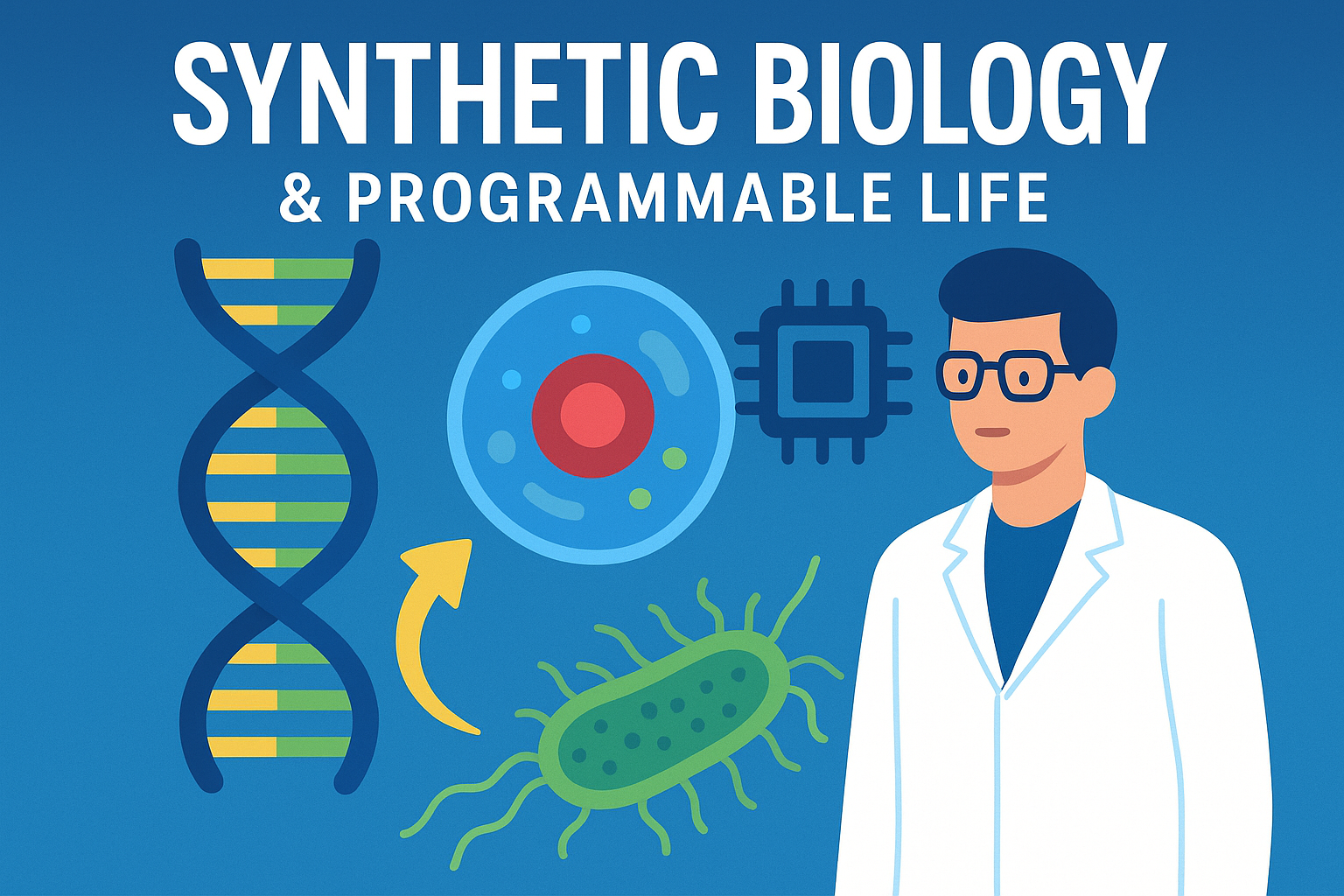In the last two decades, science has been pushing the boundaries of biology in ways that once seemed like pure science fiction. Among the most groundbreaking areas of research is synthetic biology, an emerging field that blends biology, engineering, computer science, and chemistry to create new forms of life—or reprogram existing ones—for specific purposes. This idea of programmable life is not only fascinating but also highly transformative for industries ranging from healthcare to agriculture.
What is Synthetic Biology?
At its core, synthetic biology involves redesigning organisms by engineering their genetic code. Traditional biology studies how organisms function, but synthetic biology goes a step further—it actively designs and builds new biological systems.
For example, instead of waiting for bacteria to evolve naturally, scientists can reprogram them to produce medicines, generate biofuels, or even break down plastic waste. This is possible because DNA, the building block of life, can now be treated like software code. By rewriting this code, researchers can “program” living cells to carry out desired tasks.
Programmable Life: A New Concept
The phrase programmable life refers to the idea that living organisms can be designed and controlled much like a computer program. Just as developers write code to make a machine perform specific actions, scientists can now edit DNA sequences to control how cells behave.
For instance:
- A yeast cell could be programmed to brew bioethanol instead of alcohol.
- Human immune cells could be programmed to recognize and destroy cancer cells.
- Plants could be re-engineered to resist pests without harmful pesticides.
This programmable nature of life is leading to innovations once thought impossible.
Key Technologies Driving Synthetic Biology
- CRISPR Gene Editing
CRISPR allows scientists to make precise cuts in DNA, effectively editing genes with incredible accuracy. This tool has made programmable life more practical and efficient. - DNA Synthesis
Modern labs can now write DNA from scratch. This means researchers are not limited to editing natural genomes; they can design entirely new genetic codes. - Biological Circuit Design
Just like electronic circuits, biological circuits can be engineered to make decisions within cells—turning genes on or off based on conditions. - Computational Biology
Advanced software helps predict how DNA sequences will function, making the design process faster and reducing trial-and-error in the lab.
Real-World Applications of Programmable Life
Synthetic biology is already moving beyond theory into practice. Some examples include:
- Medicine: Engineered bacteria can produce insulin, vaccines, and even experimental cancer therapies. Researchers are exploring “living medicines” where microbes live in the human body and fight diseases from within.
- Sustainable Energy: Certain microbes are being programmed to convert sunlight, CO₂, or waste into renewable fuels like biodiesel or hydrogen.
- Agriculture: Programmable crops can grow with less water, resist harsh climates, and fix nitrogen naturally—reducing the need for chemical fertilizers.
- Environmental Cleanup: Synthetic organisms may one day act like “living cleaners,” consuming pollutants, breaking down plastics, or absorbing carbon from the atmosphere.
- Food & Materials: From lab-grown meat to bioengineered silk, synthetic biology is creating sustainable alternatives to resource-heavy industries.
Ethical Questions and Challenges
While the potential benefits are enormous, programmable life also raises serious ethical and safety concerns:
- Unintended Consequences: What if engineered organisms escape into the wild and disrupt ecosystems?
- Bioweapons Risk: Could synthetic biology be misused to create harmful pathogens?
- Playing God Debate: Is it morally acceptable for humans to design life from scratch?
- Access and Inequality: Who should control these powerful technologies—the public, governments, or private corporations?
Balancing innovation with responsibility is one of the greatest challenges facing this field.
The Future of Synthetic Biology
As the technology matures, we may witness a future where biology is as programmable as software. Imagine:
- Personal medicines custom-made from your DNA.
- Cities powered by living bio-solar panels.
- Artificial microbes cleaning oceans on a global scale.
- Programmable plants growing food in deserts or even on Mars.
The possibilities are vast, but so is the need for global cooperation, regulation, and public understanding. Synthetic biology is not just a scientific revolution; it is a social and ethical one too.
Final Thoughts
Synthetic biology and programmable life represent a new frontier in human progress. By merging biology with engineering principles, scientists are unlocking the ability to design life itself. While risks remain, the potential benefits—cures for deadly diseases, sustainable energy, climate solutions, and food security—make this field one of the most promising of the 21st century.
As with any powerful tool, success will depend on how responsibly humanity chooses to use it. The future of programmable life is already being written in the code of DNA, and we stand at the threshold of a world where life is not just discovered, but designed.
